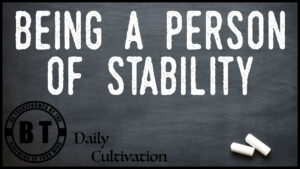
To be stable is to be sane and sensible; not easily upset or disturbed; not likely to change or fail; firmly established. Some synonyms include: well balanced, sound, of sound mind, sane, normal, right in the head, in possession of all one’s faculties, able to think/reason clearly, lucid, clear headed, rational, coherent, steady, reasonable, sensible, sober, with both one’s feet on the ground.
Matthew 7:24-27 Jesus talks about stability. He says,
“Therefore everyone who hears these words of mine and puts them into practice is like a wise man who built his house on the rock. The rain came down, the streams rose, and the winds blew and beat against that house; yet it did not fall, because it had its foundation on the rock. But everyone who hears these words of mine and does not put them into practice is like a foolish man who built his house on sand. The rain came down, the streams rose, and the winds blew and beat against that house, and it fell with a great crash.”
Stability is proof that you not only know of the words Jesus spoke but you put them into practice. It’s also interesting to note that the stability of the house was proved in a storm. The house that was built on the sand was fine until it rained and the wind blew and the streams rose.
1 Peter 1:6-7 says,
“In all this you greatly rejoice, though now for a little while you may have had to suffer grief in all kinds of trials. These have come so that the proven genuineness of your faith—of greater worth than gold, which perishes even though refined by fire—may result in praise, glory and honor when Jesus Christ is revealed.”
You faith is proved genuine through the ways you handle trials. What makes a person stable in a storm is confidence in the structure. Stability in a trial looks like, faith, hope and trust which results in your ability to see a desirable outcome, handle the situation like a champion and continue to press on towards the goal. And unstable approach to a trial or problem is to worry, fear, get mad, blame others, turn around and run. The approach you take is based off of your perspective of the situation.
Grant Cardone in his book “Sell or be sold” said that when a customer calls his office to let them know of a complaint or a problems they are having with one of the products or services they purchased, he wants all those calls to go straight to him. The reason he wants to handle the phone call is because of his perspective. Most people want to run from a complaint or a problem (I know I have). The reason Grant wants the call is because he views it as an opportunity to prove their commitment to the products and services they offer and their commitment to their customers. This approach creates a better relationship as well as often time creates more sales.
It is said that a customer who buys a product, has a problem, calls the company, the company solves the problem, is more likely to buy another product from that company then a customer who bought a product and didn’t have any problems. This is because having a problem increases communication, which allows for the growth of a relationship. This positive outcome is based off of a certain perspective.
Your perspective of who God is and who you are will determine the actions you take in a trial, storm, or problem. Jesus said, “ everyone who hears these words of mine and puts them into practice is like a wise man who built his house on the rock.” Stable.
